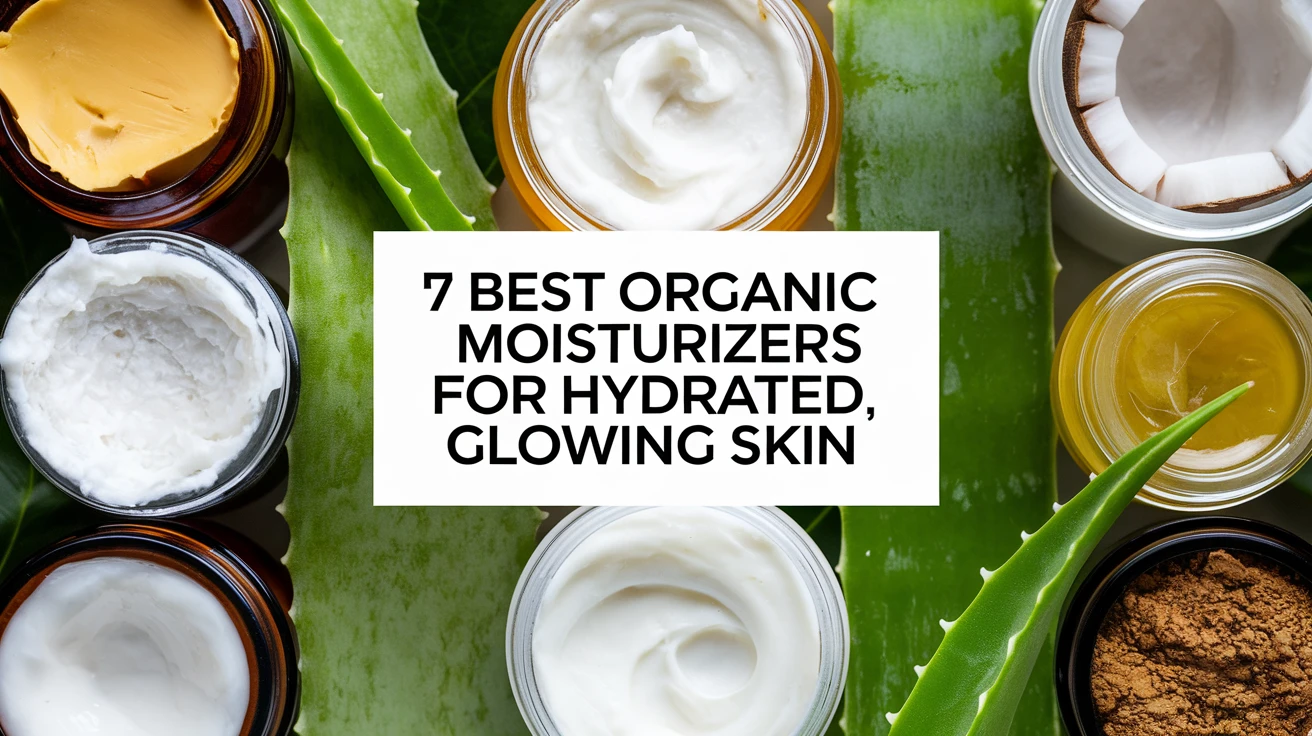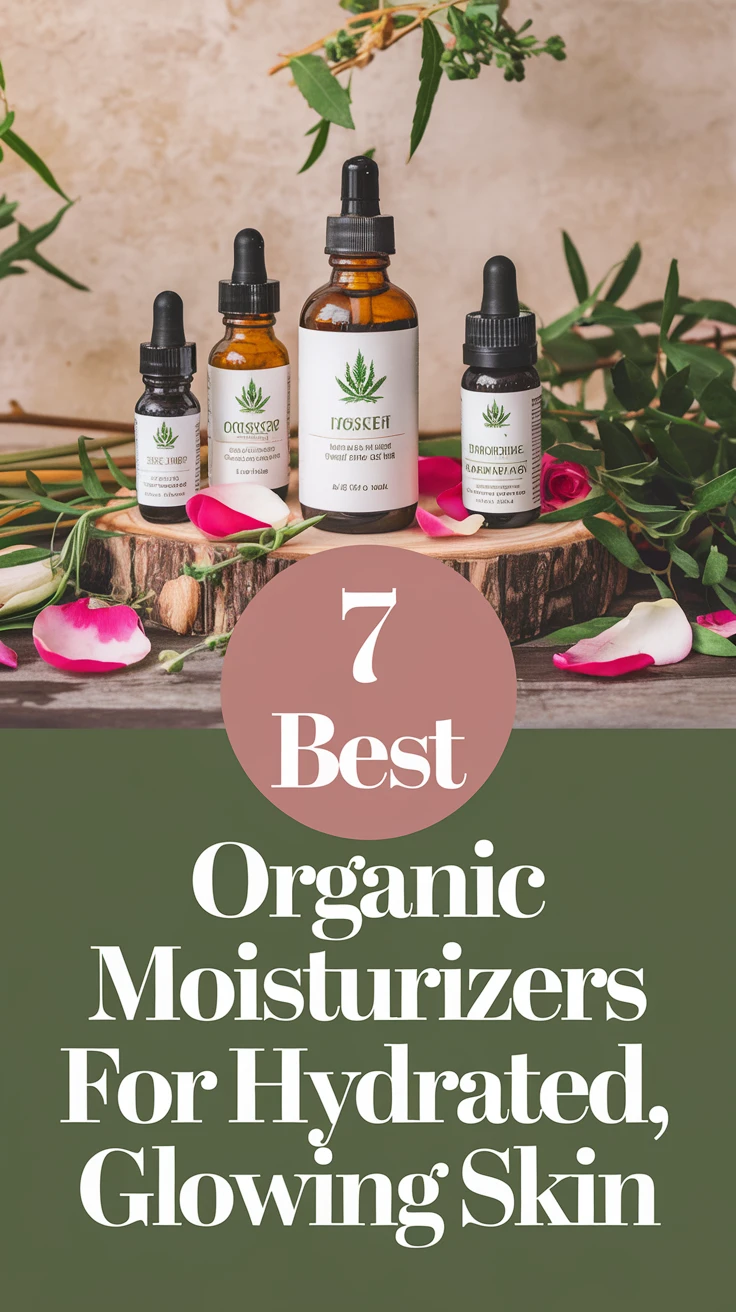
Understanding the Power of Organic Moisturizers
In the quest for healthy, radiant skin, organic moisturizers have emerged as game-changers in the beauty industry. As someone who struggled with sensitive skin and reactive rosacea for years, discovering the benefits of organic moisturizers transformed not just my skincare routine, but my entire approach to beauty. Today, we’ll explore the seven best organic moisturizers that can help you achieve that coveted hydrated, glowing complexion.
Before diving into specific products, let’s understand why organic moisturizers deserve a prime spot in your skincare routine:
- Free from harmful synthetic chemicals and preservatives
- Rich in natural nutrients and antioxidants
- Environmentally sustainable and eco-friendly
- Gentle on sensitive skin
- Often more concentrated, requiring less product per use
1. Shea Butter-Based Organic Moisturizer
At the top of our list is the versatile shea butter-based moisturizer. This powerhouse ingredient has been used for centuries in African skincare traditions, and for good reason. Raw, organic shea butter contains high levels of vitamins A and E, making it perfect for deep hydration and skin repair.
- Rich in fatty acids for intense moisture
- Natural anti-inflammatory properties
- Suitable for all skin types
- Helps reduce the appearance of fine lines
- Contains natural UV protection
When choosing a shea butter-based organic moisturizer, look for products that list shea butter among the first three ingredients to ensure you’re getting its full benefits. The texture should be rich but not greasy, melting easily into your skin.
Pro tip: Warm the product between your palms before applying to help it absorb more effectively into your skin.
2. Coconut Oil and Aloe Vera Blend
The combination of coconut oil and aloe vera creates a perfect balance of moisturizing and soothing properties. This blend is particularly effective for those dealing with both dryness and inflammation.
- Natural antibacterial properties from coconut oil
- Cooling and healing effects from aloe vera
- Lightweight yet deeply hydrating
- Perfect for tropical climates
- Great for post-sun exposure
In my experience, this combination works wonders during summer months or in humid climates where heavy creams might feel too overwhelming. The aloe vera provides immediate relief while the coconut oil ensures lasting hydration.
Pro tip: Store this type of organic moisturizer in a cool place to maintain its consistency and extend shelf life.
3. Hemp Seed Oil Moisturizer
Hemp seed oil has emerged as a revolutionary ingredient in organic moisturizers, particularly for those dealing with problematic or acne-prone skin. This non-comedogenic oil is rich in omega-3 and omega-6 fatty acids.
- Balances skin’s oil production
- Rich in gamma-linolenic acid
- Helps reduce redness and inflammation
- Supports skin barrier function
- Suitable for acne-prone skin
The beauty of hemp seed oil moisturizers lies in their ability to hydrate without clogging pores. They’re particularly effective for combination skin types that struggle with both dryness and oiliness.
Pro tip: Apply this moisturizer to slightly damp skin to lock in maximum hydration.
4. Rosehip and Jojoba Oil Complex
For those seeking anti-aging benefits alongside hydration, the combination of rosehip and jojoba oils creates a powerful organic moisturizer. This duo mimics the skin’s natural oils while delivering potent antioxidants.
- High in vitamin C and retinol alternatives
- Promotes collagen production
- Helps fade dark spots and scars
- Balances oil production
- Suitable for mature skin
Having used this combination through my early 30s, I’ve noticed significant improvements in skin texture and tone. The lightweight nature of these oils makes them perfect for layering under sunscreen during daytime use.
Pro tip: Gently pat instead of rubbing this moisturizer into your skin to enhance absorption.
5. Green Tea and Vitamin E Formula
This antioxidant-rich combination offers both immediate and long-term benefits for the skin. Green tea and Vitamin E work synergistically to protect against environmental damage while providing essential moisture.
- Powerful antioxidant protection
- Helps fight free radical damage
- Reduces inflammation
- Brightens complexion
- Ideal for city dwellers
After moving to a busy urban area, I found this type of organic moisturizer particularly beneficial in combating the effects of pollution and stress on my skin.
Pro tip: Use this moisturizer both morning and night for maximum antioxidant protection.
6. Plant-Based Hyaluronic Acid Moisturizer
While hyaluronic acid sounds synthetic, there are now organic moisturizers containing plant-based versions of this hydration superhero. These formulations typically derive their hyaluronic acid from sources like fermented soy or sweet potato.
- Holds up to 1000x its weight in water
- Provides deep hydration
- Plumps fine lines
- Suitable for all skin types
- Perfect for dehydrated skin
The transformative effects of plant-based hyaluronic acid are particularly noticeable in mature or dehydrated skin, providing both immediate and cumulative benefits.
Pro tip: Layer this type of moisturizer under heavier creams during winter months for extra hydration.
7. Avocado Oil and Calendula Blend
This nourishing combination is particularly beneficial for sensitive or reactive skin types. Avocado oil’s rich fatty acid content pairs perfectly with calendula’s soothing properties.
- Deeply nourishing and calming
- Rich in vitamins D and E
- Helps heal irritated skin
- Supports skin barrier function
- Excellent for winter use
This combination has been a game-changer for those with eczema-prone or extremely dry skin, providing both immediate relief and long-term barrier support.
Pro tip: Apply this richer formula at night to allow maximum absorption while you sleep.
Key Takeaways About Organic Moisturizers
- Choose products with clear organic certifications
- Consider your skin type when selecting ingredients
- Look for products with minimal, natural preservatives
- Store properly to maintain efficacy
- Patch test new products, even organic ones
Conclusion
The world of organic moisturizers offers something for every skin type and concern. By choosing these natural alternatives, you’re not only benefiting your skin but also supporting sustainable beauty practices. Remember that the best organic moisturizer for you may take some trial and error to find, but the journey toward healthier, more radiant skin is worth the exploration.
Frequently Asked Questions
What makes a moisturizer truly organic?
A truly organic moisturizer must contain ingredients grown without synthetic fertilizers or pesticides and be certified by recognized organizations like USDA Organic or COSMOS.
Are organic moisturizers more expensive?
While initial costs may be higher, organic moisturizers are often more concentrated, requiring less product per use, making them cost-effective in the long run.
How long do organic moisturizers last?
Most organic moisturizers have a shelf life of 6-12 months when properly stored. Always check the PAO (Period After Opening) symbol on the packaging.
Can organic moisturizers treat acne?
Yes, certain organic moisturizers containing ingredients like tea tree oil, hemp seed oil, or aloe vera can help manage acne while maintaining skin hydration.
Are organic moisturizers suitable for sensitive skin?
Generally yes, as they contain fewer potential irritants. However, always patch test new products as natural ingredients can still cause reactions in some individuals.


